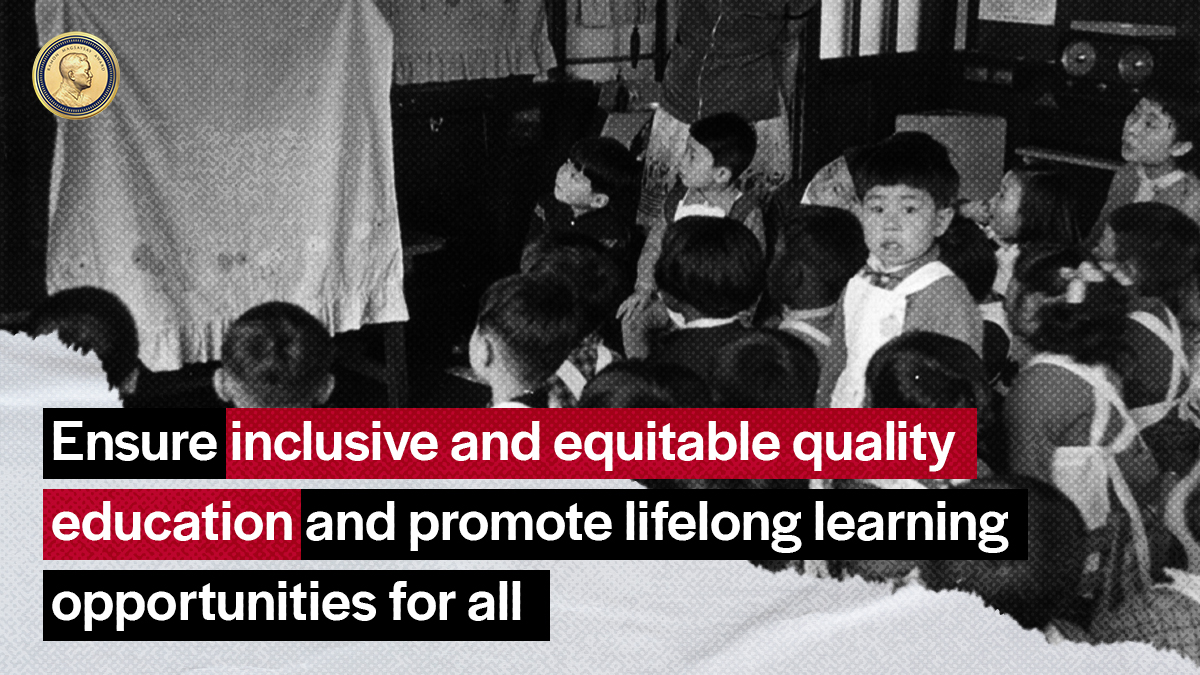The Ramon Magsaysay Awardees and Sustainable Development Goals
In 2015, the United Nations designed the Sustainable Development Goals (SDG), a collection of 17 interlinked objectives designed to serve as a “shared blueprint for peace and prosperity for people and the planet now and into the future.” But even before the UN formulated the SDGs, the Ramon Magsaysay Awardees, recipients of Asia’s premier prize and highest honor, have been working on these pressing issues of human, environmental and global development.
In this new series, we will list down some notable Ramon Magsaysay Awardees who have addressed and continue to work on humanity’s collective goals.
Sustainable Development Goal 4:
Ensure inclusive and equitable quality education and promote lifelong learning opportunities for all
SDG 4 aims to provide children and young people with quality and easy access to education plus other learning opportunities. One of its targets is to achieve universal literacy and numeracy. The prevalence of extreme poverty, insurgency, communal conflicts, and other factors has significantly reduced the progress in many developing countries. Children from poor households have a higher probability of dropping out of school than their counterparts from rich backgrounds. Disparities between rural and urban areas remain high.
Inclusive quality education has been a major issue that the Ramon Magsaysay Award Foundation highlights since the first Ramon Magsaysay Awards were given in 1958. Many recipients of Asia’s premier prize and highest honor have risen up to the occasion and have addressed education gaps in their respective societies. In this fourth installment of our 17-part series, we feature Magsaysay laureates who have worked and are working on addressing SDG 4. Here are a few of them:
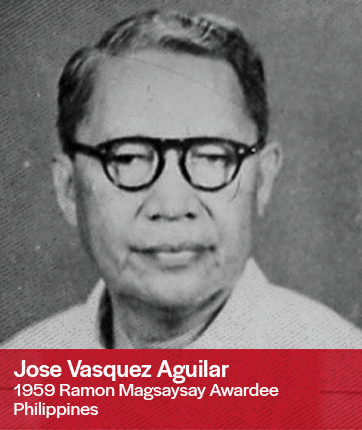 |
Recognized as the Father of the Community School Movement in the Philippines, JOSE VASQUEZ AGUILAR worked on pioneering reforms to ensure that community life is integrated in the education system.
In Iloilo, Philippines, he developed his community school concept. An integral part of his experiment was the use of the vernacular as the medium of instruction in the first primary grades, as a natural and firm link between the schools and the people. The Philippines’ Bureau of Public Schools supported his effort. Other superintendents adopted some of his methods and evolved new ones of their own and, subsequently, the Bureau incorporated the community school scheme and the use of the vernacular in its national program. At the height of his career, AGUILAR sought to address issues like the high number of dropouts, low level of language proficiency, irrelevance of the school curriculum to daily realities, and the cultural gap between the elites and the ordinary citizens. JOSE VASQUEZ AGUILAR is the first Filipino individual to receive the Ramon Magsaysay Award. The Award was bestowed upon him in 1959 during the 2nd Ramon Magsaysay Awards. |
| Illiteracy has been one of the world’s most challenging problems. Y.C. JAMES YEN saw the tragedy of illiteracy among his own people in France during the first World War, when he was besieged by Chinese laborers seeking help in writing to their families at home. Working with them to read and write letters, Yen recalled, he found “for the first time in my ignorant intellectual life” the value of the common people of his own country. What they lacked was education.
Returning to China in 1920, he began a career dedicated to educating rural people who had no opportunity for schooling and reeducating the educated to share in this task. JAMES YEN has spread the seeds of his mass education ideas to other Asian countries. UNESCO’s Fundamental Education Movement in Southeast Asia has drawn much from his program. He has become a citizen of the world, who, by his works, gives substance to the dream that one day men everywhere may freely enjoy security, equal opportunity and a sense of international brotherhood. Known to his many English speaking friends as “Jimmy,” he is remembered as a Chinese educator and organizer known for his work in mass literacy and rural reconstruction, first in China, then in many countries. |
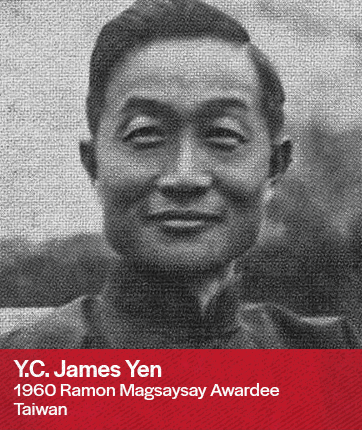 |
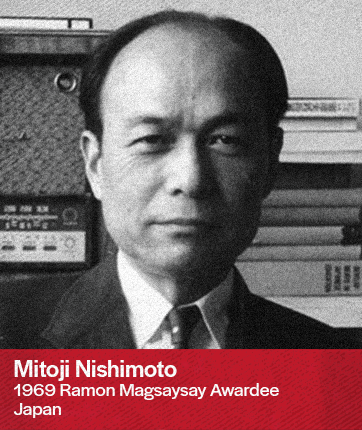 |
In the 1920, the British Broadcasting Corporation (BBC) had begun producing special programs for schools for radio. Inspired by this innovative use of a mass broadcasting system, Professor MITOJI NISHIMOTO in 1925 gave his first radio lectures on education. In 1933, he became Nippon Hoso Kyokai’s (NHK) Education Director wherein he organized Japan’s first school broadcasting.
In mid-century Japan, NISHIMOTO’s has been the most influential voice in shaping a fuller use of broadcasting in Japanese education. That year, anticipating the opportunity and need for materials that followed the inauguration of television five years later, he formed the Japan Radio-TV Education Association. Professor MITOJI NISHIMOTO received the Ramon Magsaysay Award in 1969 for “44 years of discerning design of Japan’s superior educational radio and television broadcasting system.” |
| We all know that libraries are safe spaces where children and adults can immerse themselves in a world of learning. But in truth, these hallowed rooms are not made accessible for millions of people in Asia.
The Village Mini-Library Movement, founded by OHM DAE-SUP, was inspired by his childhood after he moved with his poor family from Korea to the Kobe area of Japan. While living in Japan, OHM discovered that a wealthy man had opened his personal library to neighbors, and OHM was amazed at the knowledge stored in books. As he read avidly, OHM vowed that when he had made enough money he would bring back books to villagers in Korea. OHM DAE-SUP, a South Korean businessman, has opened 35,000 small libraries since 1951. ”As a salesman of 18 or 19, I read a great deal. I began to sense the power of books, a weapon for people in their struggle for survival,” he said. |
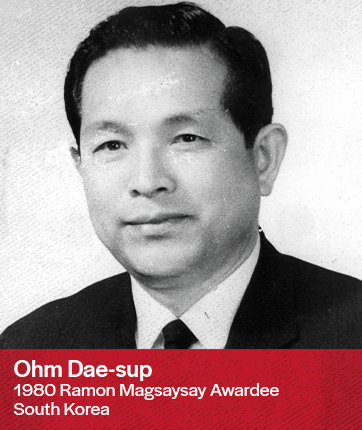 |
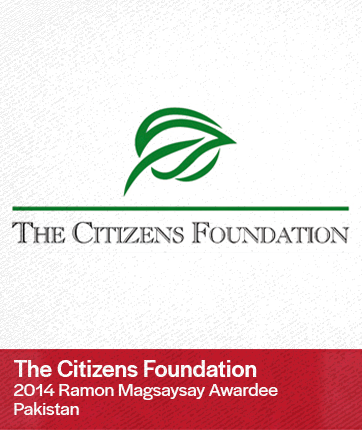 |
One of SDG 4’s targets is to “eliminate all discrimination in education.” In Pakistan, nonprofit organization THE CITIZENS FOUNDATION (TCF), established by a group of six Pakistani business leaders and executives, aims to remove barriers of class and privilege through affordable, quality education by making Pakistanis agents of positive change.
TCF maintains a balanced gender ratio; close to 50% of students are female. In order to achieve this goal, TCF exclusively hires female teachers to make parents comfortable with the idea of sending their girls to schools. Each school hires support staff from within the community, who also help convince parents to send their children to school, especially girls. TCF operates a network of 1,833 school units, educating 280,000 students through over 13,000 teachers and principals, and over 17,400 employees. The organization received the Ramon Magsaysay Award in 2014 for “the social vision and high-level professionalism of its founders and those who run its schools, in successfully pursuing their conviction that, with sustained civic responsiveness, quality education made available to all—irrespective of religion, gender, or economic status—is the key to Pakistan’s brighter future.” |
| SAUR MARLINA MANURUNG, fondly called “Butet”, is an Indonesian anthropologist who decided to devote her life to protecting and uplifting the lives of Indonesia’s Orang Rimba, of the forest people. She formed SOKOLA with four other NGO colleagues, focusing on the education of forest people, starting in the Jambi jungle. Their major program is called Sokola Rimba, or “Jungle School.”
SOKOLA emphasizes life-skills rather than academic knowledge, stressing basic literacy for children and practical skills to cope with the changing forest environment. Since the Orang Rimba are hunters-and-gatherers, SOKOLA schedules are flexible and teachers must follow them as they move. A cadre of young, newly-literate Orang Rimba are now able to serve their people as tutors and community leaders. Trained in advocacy and empowered to liaise between their communities and the outside world, these youth represent their elders and “speak to the national government” on policies that impact on the forest people. |
 |

